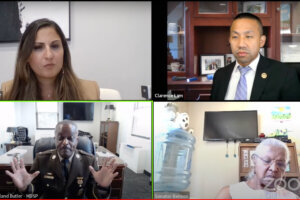This article was republished with permission from WTOP’s news partners at Maryland Matters. Sign up for Maryland Matters’ free email subscription today.
This content was republished with permission from WTOP’s news partners at Maryland Matters. Sign up for Maryland Matters’ free email subscription today.
The head of the Maryland State Police promised lawmakers that his department is doing everything it can to root out discrimination and increase diversity among the ranks.
The Maryland State Police is subject to at least two lawsuits and two Department of Justice investigations involving allegations of racial discrimination. A recent culture survey commissioned by the department was largely ignored by most of the 2,200-employee agency.
Even so, Maryland State Police Superintendent Col. Roland Butler expressed optimism for the results of the ongoing litigation.
“Whatever comes out of that, we’ll take that, address it, and we’ll fix the problems that exist,” said Butler. “We’re going to become a better agency. I think we’re head and shoulders above many of the agencies that we deal with right now. And we’re going to continue to grow just by open and honest dialogue.”
Butler made the comments during a Wednesday hearing before the Joint Committee on Fair Practices and State Personnel Oversight.

Butler, the first Black man in state history to head the agency, had nearly 30 years of experience in Maryland State Police when he was tapped in February by Gov. Wes Moore (D) to become superintendent.
He faced a bruising confirmation battle that concluded days before the end of the 2023 legislative session. Black lawmakers and an organization representing Black officers said Butler failed to do enough to address complaints of racism and disparate treatment of Black officers when it came to promotions and discipline.
Last summer, the Department of Justice launched an investigation into alleged racial discrimination in hiring. There is also a separate inquiry into promotion practices within the department.
“So far we’ve cooperated with them fully with no negative feedback,” said Butler.
The agency also faces two lawsuits.
The first, a class action case, alleged racial discrimination within the department.
A second lawsuit filed by a 25-year veteran of the Office of the State Fire Marshal alleges a culture of racism within that office, which is overseen by the State Police.
Butler declined to speak about the specifics of either case Wednesday, citing the ongoing litigation.
“We’re going to continue to be transparent and be upfront with people and give them the information they need,” Butler said.
Butler was also asked about how the agency handled a 2020 incident in which a state police corporal texted an offensive, doctored photo to other officers he supervised. The photo of George Floyd was texted just 8 days after he died while in the custody of Minneapolis Police.
It took three years to discipline the corporal and force him into retirement.
“I’ve been counseled to be very cautious as to what I say and stick with the initial statement that came out,” said Butler. “I don’t want to be dragged into a lawsuit where that individual sues me. What happened was unacceptable. The processes that were followed, as long as that was drug out, was certainly unacceptable.”
Concerns about disparate treatment of employees and fears of retaliation remain, according to Sen. Clarence Lam (D-Anne Arundel and Howard).

“I’m still receiving complaints from folks that work within the state police that are concerned about retaliation, and when it comes to whether it was formerly fair practices or now, ODEI [the Office of Diversity, Equity and Inclusion],” said Lam, the Senate co-chair of the oversight committee. “They feel that when they bring up concerns, they’ll being retaliated against. So, there’s this continuing culture of employees reluctant to report concerns of discrimination, because it is not going to end well for the person that’s bringing up the concern.”
“When you talk about retaliation, my staff knows it will not be tolerated and I expect them to investigate and fully I put people in place that are capable of examining what they’re dealing with as far as their structure,” Butler said, responding to Lam. “They’re empowered to do that.”
An immediate area of focus, according to Butler, was to expand the Office of Diversity, Equity and Inclusion.
“I wanted the people that were going to that office for help or seeking guidance to understand how vast the number of resources were there: from diversity encompassing individual differences, down to equity, being treated fair across the board, to inclusion — trying to create an inclusive environment where everybody is part of the solution.”
In addition to rebranding the office and beefing up staff, Butler said he plans to move the office out of other state police buildings.
“We’re still looking for a site now. We’ve identified three possible locations. If it’s something that will enhance the anonymity of an employee that comes in says, ‘Hey, I can talk about whatever concerns me without fear of retribution or retaliation,'” said Butler.
The superintendent acknowledged that a culture shift within his department is necessary.
The Maryland State Police, under Butler, hired Morgan State University to survey the 2,200-employee agency on its workplace culture. Only 40 people responded, said Butler.
“We got the report back,” he said. “There were some things that I think we all agree we could do better.”







